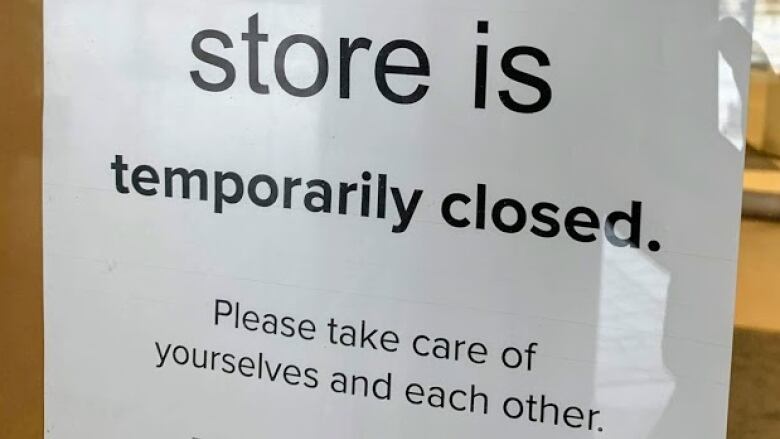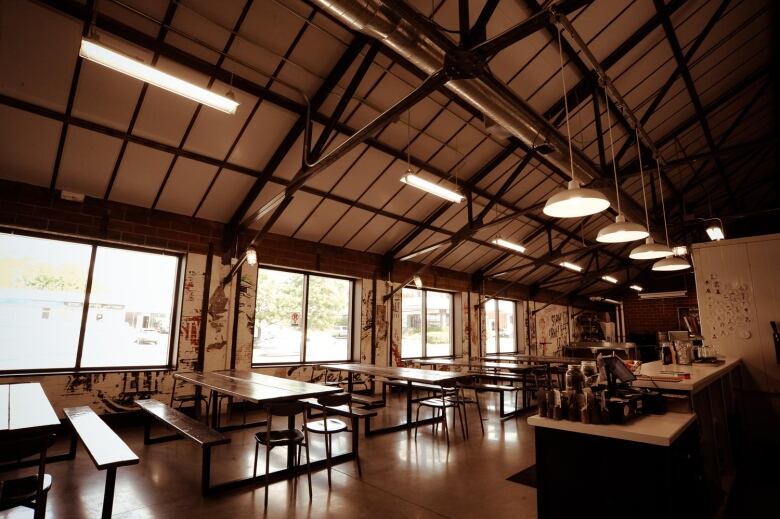Pivot, adapt, change-up: Doing what it takes for businesses to stay open in Waterloo region
4 entrepreneurs on how they overhauled their business model

Area businesses hoping to return to normal from the original June 2stay-at-home order deadline in Ontario could be closed a little longer under the provincial government'sthree-step reopening planannounced Thursday.
Beginning the week of June 14, the province has approved some non-essential retail will reopen and outdoor restaurant dining will be allowed. While stage twowill see the resumption of personal care services. The third stage will expand to indoor settings.
As the pandemic dragged on into the third wave, area businesseswere forced to reevaluate their business plan and some were forced to adapt and make changes in order to survive.
If the Ontario government's reopening plan stays on track for the week of June 14, Sandra Gibson's business will have been closed for almost 30 weeks, when you factor in theplan and the time she needs to prepare to open the doors to a new location.

Gibson, the owner of Deja Vu Spa and Medi Spa,is moving back to her original business plan. She's also moving locations, selling her longtime location on Guelph Street for a new and smaller space on Frederickand Edna Streetsin Kitchener.
When that shop finally opens, she will take only one employee with her and be without two hair stylists, she said.
"My stress and anxiety level has been quite highbecause I feel like I have no control over my businessbecause the government essentially dictates now what I can and cannot do.I basically cannot work because of what they're telling me," said Gibson.
"I had to let go two hair stylists and I'm going back to my original business model ... and I'm bringing one staff member with me."
'I was ready to throw the computer'
Gibson saidshe followed all the health and safety rules at first, ordering PPE, Plexiglass and following sanitation and sterilization protocols. She was also able to sell some products and offer help to clients through an online platform.
All of it was at an extra cost that she saidwas frustrating when she had to fill out the online application form to get reimbursed. She saidshe was able to get a property tax grant, but at the end of the day it didn't cover all the bills.
She said one time when she was filling out the form, she made "the slightest little typo" or left abox unchecked.
"The whole thing would just exit out, and I spent hours trying to apply for something. I was ready to throw the computer out the front door. And I'm like, I've been at this for hours to get a thousand dollars. It's almost not worth it."
Lack of support
Danielle Green, who operates the Artisanal Design Company on Fairway Road, understands the frustration of applying for a government grant.
While she considers herself lucky to receive a government business grant, getting it was a long and complicated process.
"I had one service agent [say] when I inquired about my payment, she told me good luck. So they know absolutely nothing about the status of your program and there are a lot of people who still have not received even their first grant payment," said Green.

"And then for the second grant, [they're] asking me to explain the nature of my business and what I do. I've been paying taxes. How do you not know what I do, what my business does?"
Green had to make some changes to her shop which sold gifts, florals and balloon displays and mens and womens clothing. Now, she sells through an online platform that's available for curbside pick up.
"It's been a roller coaster ride and especially ever since COVID," said Green. "It has been a little bit of a curse, but I think a blessing more than anything because it forced me to really pivot my business model so that I could survive this. And I think that's the most important thing."
Green saidwith people at home "deciding to wear their PJs and chill", she has had to rethink the amount of summer stock she was going to order. An order that had to be submitted by February. In the end she decided to not purchase that much because she believesby the time theyfully open they'll be prepared for a fall clothing line.
Waiting for the green light
Ryan Lloyd-Craig, the co-owner of Ignite Group of Brands, saidhis team has a game plan for every possible scenario.
They've had time to prepare for it since the early days of the pandemic when the province announced the first emergency shut down.
"We're preparing to obviously open our outdoor patio spaces first in some capacity.We've already put a tent up for a secondary patio graffiti market and we have a tent going up at Crows Foot," said Lloyd-Craig.
"So potentially we could have 150 people outside for the foreseeable future. But without a tent, the weather would really cut into that, which we found and experienced last year."
Ignite runs a number of locations including the Rich Uncle Tavern, Graffiti Market, Stockyards Brewing and Stockyards Coffee in Kitchener and the Crowsfoot Smokehaus in Conestogo. It also hasa retail brand called Wilhelms Provisions, which sells barbecue sauce and jams.
Lloyd-Craig hopes to have two of their three large restaurants that can seat 250 people reopen.But the first potential summer dining experience will start outside under a patio tent.
In preparation of a green-light to open from the government, they've started hiring. Some waitstaff and kitchen crewwho were laid off during the pandemic have committed to returning.
"The last time the [government] gave us 12 hours noticeto find staff and open up,"said Lloyd-Craig.
"We made the conscious decision [that]'we're not ready,' sure we can open up and we'll be very ad hoc. But the experience the customer will get would not be up to our standards."
Ignite Group of Brands also has a growing list of backyard events planned including catering multi-birthday celebrations and weddings.
"[There are] a lot of requests forthe 10 to 20 [people] backyard catering events for the summer. Whether it's been a postponed family event for a multi-birthday celebration.We've got tons of requests," said Lloyd-Craig.
Like other restaurant locations, they eventually pivoted to the what Lloyd-Craig saidwas a flooded takeout market, which led to waiting for the backlog of takeout containers to adjust the menu to make sure the food travels well.
"Some people are looking for that poutine that we used to have on the menu. But we don't want to serve something that by the time we get home, it's full of mush.So,we consciously made that decision to change our menus," says Lloyd-Craig.
Excluded from provincial business grants
Like other small businesses the Descendants Beer and Beverage Company refocused their energy from their restaurant and live event space, which were big revenue generators, to keeping their retail outlet on Victoria StreetNorth open and honing in on their take-home brand beers.
General Manager Bonnie Nethery saidit was the only source of revenue the company was left with and made up the lowest percentage of gross sales, accounting for 12.5 per cent.
"We had to adapt ... Our retail store was always the last thing in line to focus on," said Nethery. "We did learn a lot about streamlining and improving our production and making it a little bit more consistent. [We] improved the variety that we offer and made sure that we consistently have lots of stock on hand for our customers."
Staffing levels went from 20 peopledown to two:Bonnie Nethery and the brewery owner.
They reached out for financial aid from the federal and provincial governments to help level off the 42 per centdrop in overall sales from April 2019 to April 2020.

The provincial government turned down their request because breweries and wineries were excluded from the provincial grant money. The federal government wage subsidy grants allowed the owners to bring back three more staff.
But with only five people working at the craft brewer, re-opening is going to take some time to get it right as it includes hiring staff and ordering food to get people back into their restaurant and patio.
Bonnie Nethery remains optimistic.
"Every day that we are here is another day where we count ourselves lucky," said Nethery.
"And we just hope and pray that we can get ... another day with the subsidies, and that hopefully when we can reopen, will be able to have some traction and make it back."












_(720p).jpg)


 OFFICIAL HD MUSIC VIDEO.jpg)
.jpg)



























































































